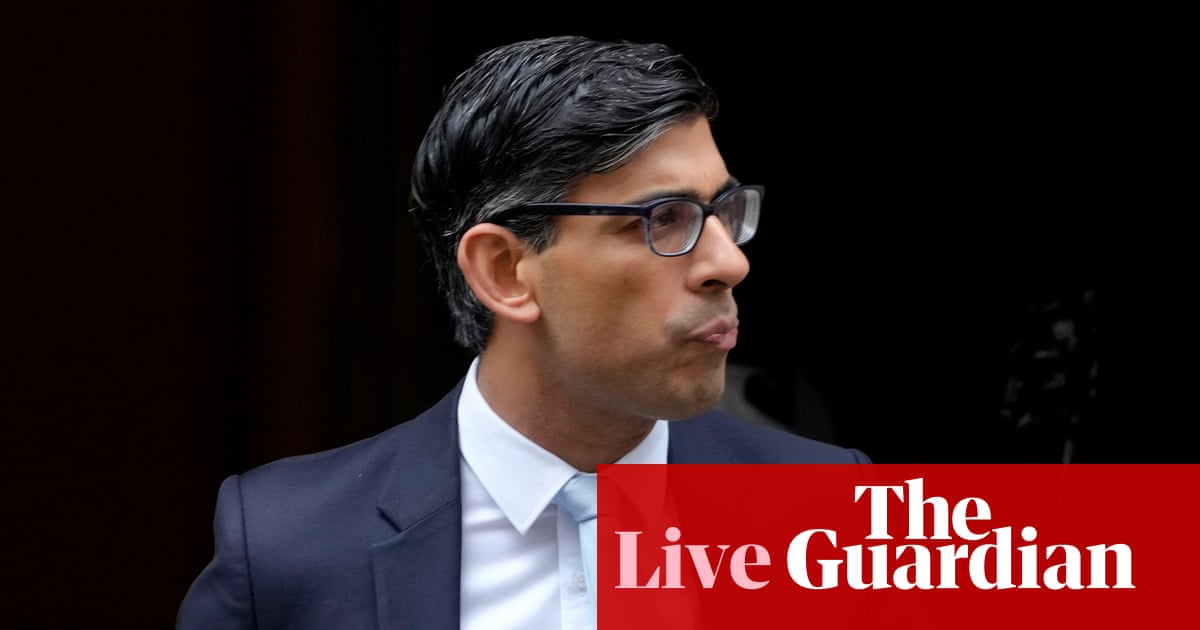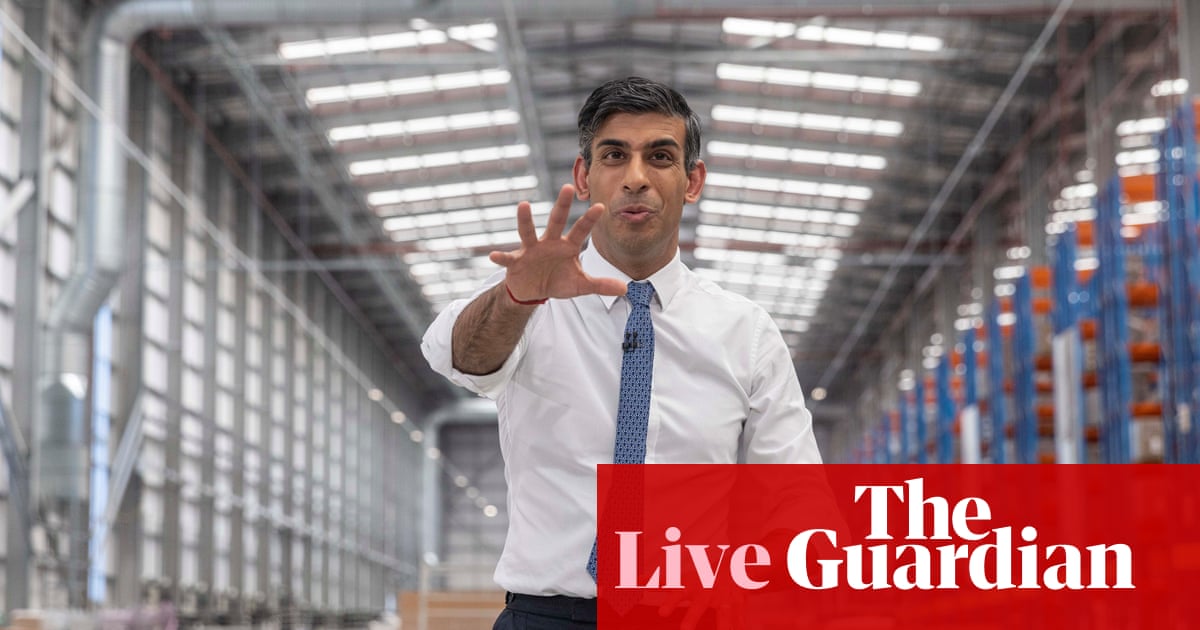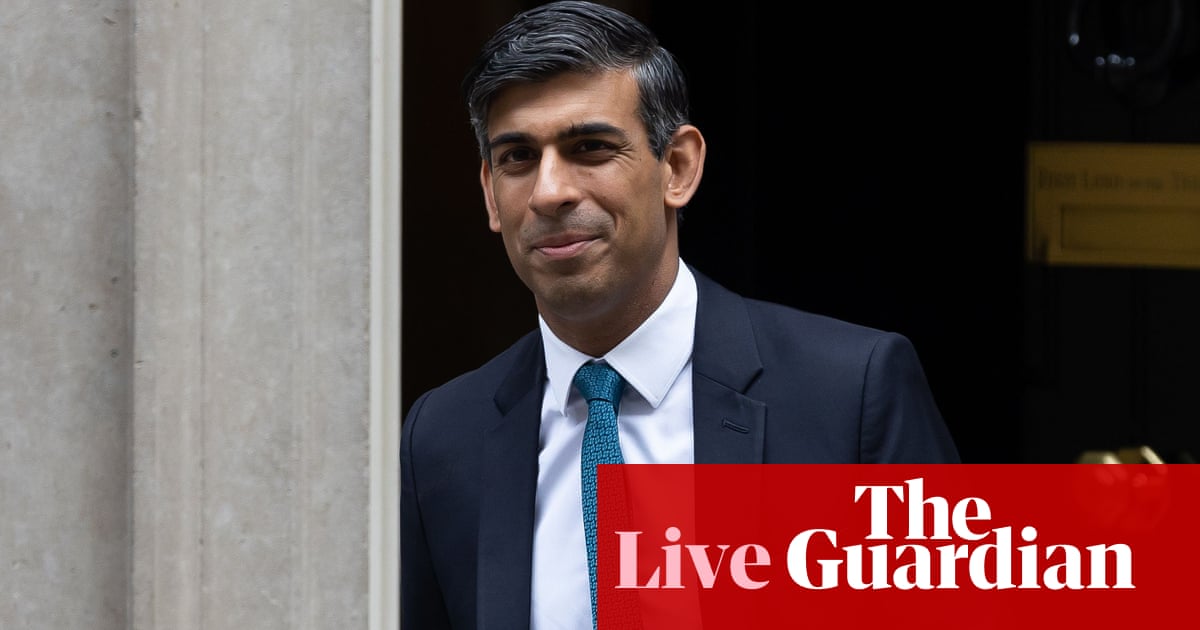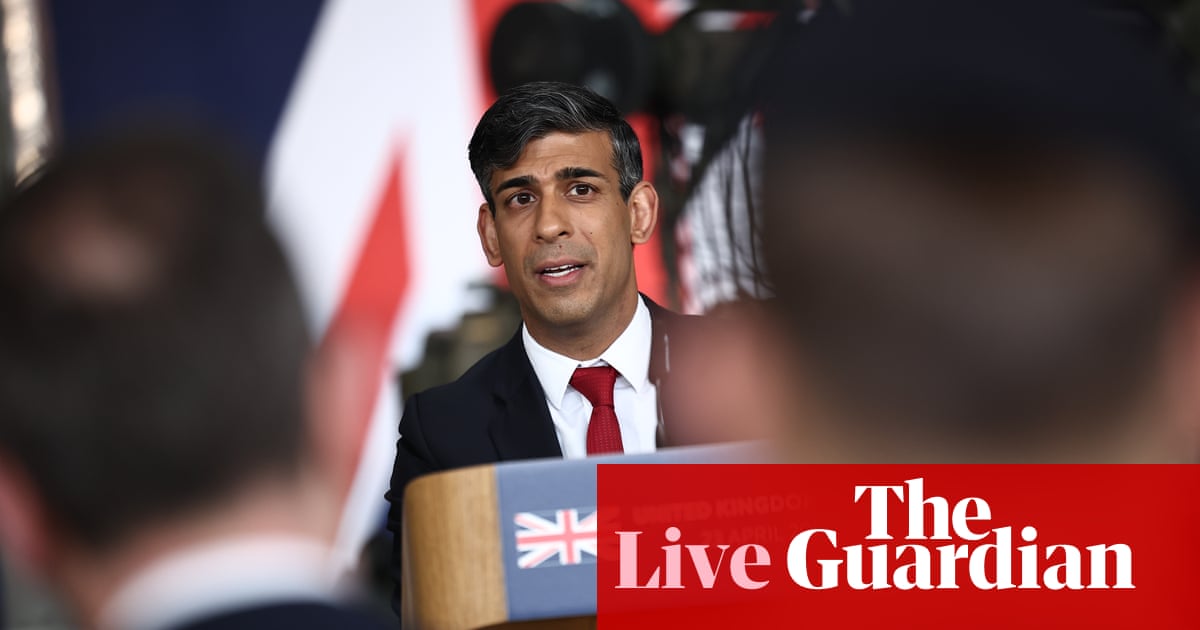
Afternoon summary
Rishi Sunak has denied claims that the government has promised to start flights carrying asylum seekers to Rwanda by the summer. Giving evidence to the Commons liaison committee, asked about reports about this supposed pledge, he replied:
No one has promised flights by the summer … what we have said is we will start flights as soon as we can after legal proceedings have completed.
As the Daily Mirror’s John Stevens points out, the claim that the flights were due to start by the summer was widely reported by journalists who accompanied Suella Braverman, the home secretary, to Rwanda recently.
Braverman was not quoted directly making the summer pledge, but a Home Office insider was quoted as saying “we are certainly working towards getting the flights off before the summer”. The Mail on Sunday splash headline attributed the promise to Braverman.
Sunak faced another tricky Braverman-related question at the hearing when he was asked about her claim that the south of England is facing an “invasion” of asylym seekers. Sunak did not endorse Braverman’s language, but he said the problem was significant. He told MPs:
It’s very clear that the scale of the problem is significant and growing.
When you’ve had a quadrupling or quintupling of the number of illegal arrivals in the space of just two years, it’s important to actually recognise the pace of what’s happening, and that’s a very large number and it’s growing very quickly.
Kate Forbes, who was narrowly beaten by Humza Yousaf in the SNP leadership contest, has turned down a job in his government. The news broke after MSPs formally voted to nominate Yousaf for first minister. This is from the BBC’s Glen Campbell.
Jeremy Corbyn has issued a statement saying the Labour party’s decision to block him from standing as a candidate at the next election is “a shameful attack on party democracy, party members and natural justice”. The statement implies that he will stand again at the election as an independent.
I’m back, picking up from Emily Dugan.
Turning back to Jeremy Corbyn, officers in his local Labour party, Islington North, have issued a statement criticising the decision to block him from standing as a candidate for the party.
Environment secretary Thérèse Coffey attacks Farmers" Weekly, suggesting it"s biased
There were extraordinary scenes in the Commons environment commitee earlier when where Thérèse Coffey, the environment secretary, was being grilled by MPs now.
Despite representing farmers, she said, “I am not going to pretend to read the editorials in Farmers’ Weekly,” when asked by chair Sir Robert Goodwill if she had read an editorial which referred to her appearance as NFU conference as a “car crash”. She said this is because “I am into information and facts”.
She also launched a scathing attack on the author of the piece, Farmers’ Weekly editor Andrew Meredith, accusing him of “voting Liberal Democrat for a decade before joining Labour.” This is false; Meredith – a fine journalist, incidentally - tells me he has never been a member of a political party and seemed rather baffled by the personal attack.
Liberal Democrat environment spokesperson, Tim Farron, defended Meredith, notwithstanding his denial of ever supporting the party.
He told me: “Comments like these demonstrate the hostility of the Conservative government towards farmers just trying to get by.”
Coffey also refused to respond to comments by Tesco CEO John Allan about food suppliers profiteering post pandemic, claiming not to have read or seen the remarks, which were aired on the Laura Kuenssberg show.
Additionally, she rejected the committee’s recommendation that she release an annual food security report because “it takes a considerable amount of time”.
In a final series of questions, Sir Bill Cash (Con) says that the Windsor framework does not represent the kind of union that the people of Northern Ireland expect.
Sunak says “I believe this is about the ‘delicate balance’ of the Good Friday agreement and that the Windsor Framework does that.”
He adds: “I want to see power-sharing up and running and that’s what the people of Northern Ireland need and deserve.” He says he thinks the framework “does have broad support”.
The session has now ended.
Back on Northern Ireland and the Windsor framework, Sir Bill Cash (Con) asks if Northern Ireland will be perpetually locked into EU laws, including new ones and asks how that fits with Sunak’s support for the union.
Sunak says that Northern Ireland will have the ability to have their say over laws and ultimately to block them if they don’t agree with them.
Angus Brendan MacNeil (SNP) asks Sunak about independence for Scotland. He asks if Sunak would prefer Scotland to decide on the issue on the basis of an election.
Sunak says “I don’t think it’s appropriate to hijack a general election” and that there has already been a referendum on the issue.
Dame Diana Johnson (Lab) moves onto the government’s rhetoric on immigration. She asks whether Sunak believes it is politically charged to use the word “invasion” in relation to small boats.
Sunak says “it’s very clear that the scale of the problem is significant and growing” but does not answer the language question. He adds that what matters is action – to which Johnson quips: “language matters, doesn’t it prime minister?”
Sarah Champion (Lab) moves onto international development spending. She asks why no budget is ringfenced by the Treasury to support refugees in the UK, adding: “Why is it that you think it’s fine to raid the overseas development assistance budget?”
Sunak says the government provided an additional £2bn on spending for refugees after the outbreak of the war in Ukraine and says: “We remain one of the leading spenders on international development anywhere in the world.”
Caroline Nokes (Con) asks what will happen to Afghan refugees who helped British troops and might have been eligible under the relocation schemes but instead arrive on small boats.
When Sunak does not answer the question, Nokes asks: “Is it right that an Afghan female judge or MP who arrived on a small boat should be treated differently [than one who arrived before the new policy]?”
Sunak says “the point is we have to break the cycle” of criminal gangs bringing people over by boat and that taking people to an alternative safe country such as Rwanda is “reasonable”.
The committee has moved onto the issue of small boats. Caroline Nokes (Con) asks whether children under the care of the Home Office have the same protections under the Children Act as those in local authority care.
Sunak dodges the question and says he and the government take the welfare of children seriously. He says their policy on small boats treats people humanely and safeguards children’s welfare but also breaks the cycle of criminal gangs.
Childcare is a big issue on the petitions committee website, Sir Bernard Jenkin says.
My colleague Emily Dugan is taking over the coverage now.
Catherine McKinnell (Lab), chair of the petitons committee, goes next.
Q: Would you agree childcare is in crisis?
No, says Sunak. He says there was a big package of measures in the budget.
Q: People have raised safety concerns about the changes to staff/child ratios. And why is the government giving a £600 bonus to people who sign up individually as a childminder, but a £1,200 bonus if they sign up through an agency.
Sunak says he thinks this scheme was designed in consultation with the sector.
Pressed why private agencies are getting more, Sunak says he will look into this.
Pressed again, he thinks recruitment costs are higher for agencies.
McKinnell asks, cryptically, if Sunak has anything to declare.
No, says Sunak. He says all his interests are declared in the normal way.
(She seems to be suggesting that he has money invested in a childcare recruitment agency.)
Q: What do you want the NHS to do differently to tackle economic inactivity?
Sunak says the main focus was on musculoskeletal conditions. He won’t go into the details, he says. But he says the OBR said it was the biggest package of supply side measures.
Work can be helpful to people’s mental health, he says.
Stephen Crabb (Con), chair of the Welsh affairs committee, goes next.
Q: The crown estate will make enormous sums from offshore wind. Should that money be earmarked for port infrastructure?
Sunak says the government is already investing in port infrastructure.
Sir Bernard Jenkin says at the end of the Labour government the aircraft carrier programme was paused to save £150m. But that cost an extra £650m, he says. Has the same calculation been done with HS2?
Sunak says he is sure the transport department has considered this point, but he says he does not have the cost/benefit figures to hand.












